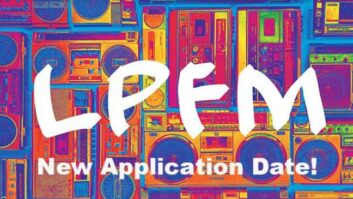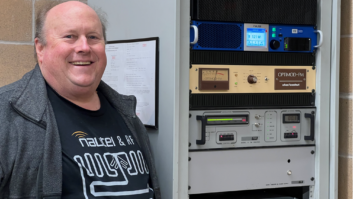
This studio serves LPFM station WDPE in Dover/New Philadelphia, Ohio, which went live in July.
Credit: Courtesy Dan Slentz This is the final article in a series about low-power FM. In the first three installments, we focused on considerations for building, preparing to launch and operating an LPFM facility; read them at www.radioworld.com/lpfmregulation. Now let’s look to the future for some long-range planning.
STREAMING
Although LPFMs are noncommercial, locally-based operations, you still need to be where your audiences are.
Nowadays that increasingly could involve streaming your programming to mobile devices. Streaming can also enable LPFM stations to supplement their broadcasts with an extra channel of program material and to attract listeners beyond their limited on-air service areas.
Your tech folks can advise with arranging for posting your stream to directories and either setting up your own server or paying a streaming audio server to host your webcast signal.
Legal requirements include two types of licenses for music. The compositions themselves are licensed through ASCAP, BMI and SESAC, which currently charge a total of approximately $800 per year for LPFM streaming licenses. Recordings are licensed separately through SoundExchange, which charges most LPFM stations $500 per year for streaming plus an additional $100 per year to waive its requirement of submitting monthly reports of every song played (well worth it!). Even for talk formats you may still need music licenses, although certain brief uses of music can qualify as fair use and be exempt from licensing.
These licenses pertain only to streams of your broadcast signal. Music contained in independent programming streams and podcasts (audio streams that can be downloaded at the listener’s convenience) requires separate licenses for reproduction and distribution.
UPGRADES AND MOVES
Certain technical modifications may be made without prior FCC authorization but are subject to filing for a modified license within 10 days of completion. These include replacement of a tower with a new tower of identical height and geographic coordinates, replacement of an antenna at the same approximate height and replacement of the transmission line while preserving the same effective radiated power.
Certain other modifications are classified as minor changes and require a construction permit but can be filed at any time. These include changes in channel to adjacent or IF frequencies (or any frequency upon a showing of reduced interference), most site moves up to 5.6 km, corrections of geographic coordinates and changes in antenna height more than two meters above or four meters below the authorized value.
Such minor changes must meet all applicable separation requirements. Other changes that do not qualify as minor can only be filed in a window opened for new and major change applications.
If circumstances require, an LPFM station may go dark, provided that the FCC is notified within 10 days and authority is sought within 30 days. However, with few exceptions, a license will automatically expire after 12 continuous months of failing to broadcast.
TRANSLATORS
Another way of extending coverage is through an FM translator. LPFM licensees may own one translator (Tribal Applicants may own two) subject to strict technical limitations — the 60 dBu contours of the LPFM and translator must overlap; their antennas must be within 20 miles of each other (10 miles in the top 50 urban markets); and the translator must synchronously rebroadcast the primary analog or HD-1 digital signal of the LPFM which must be received by the translator directly over the air.
Of course, all of this assumes that translators are available and affordable. Applications for new translators are only permitted during filing windows that are quite rare — indeed, the last one was in 2003, from which many applications remain pending. The recent ability of AM stations to use existing translators has resulted in a vast surge in their value and prices. Availability may be further eroded by the commission’s plan to enable AM stations to apply for new translators.
OWNERSHIP CHANGES
A mere construction permit for an LPFM station cannot be sold, or even donated, to other entities. In addition, before its license can be transferred, an LPFM station must be operated by the original applicant for three years. After that, it may be sold, but only to an entity that satisfies all the eligibility criteria required for the LPFM service. Even then, the total consideration cannot exceed the depreciated fair market value of the physical equipment and facilities.
The FCC recognizes that boards of directors of LPFM licensees are bound to change over time, whether suddenly or through gradual evolution. Transfers of control arising through replacement of a majority of board members are permitted, but subject to filing a pro forma application on FCC Form 316. Even so, no new board member may have an attributable interest in any other medium subject to FCC ownership restrictions (including radio, TV, translators and most nearby local newspapers). At least 80 percent of board members must be U.S. citizens.
LICENSE REFERRAL
It seems like a long way off, but when the current term ends, your license will have to be renewed. Applications for the next eight-year term will be due from 2020 to 2022, depending on your state. The form mostly requires certifications of legal operation during the past term. Generally, in the absence of relevant objections or a pattern of serious FCC rule violations a successful renewal can be assumed.
Prior to its birth and during its infancy, LPFM encountered hostility from much of the established radio industry. But hopefully LPFM is becoming a valuable ally to augment full-service stations with outlets for community groups and local programming.
Peter Gutmann is attorney with Womble Carlyle Sandridge & Rice LLP. He can be reached at [email protected].











